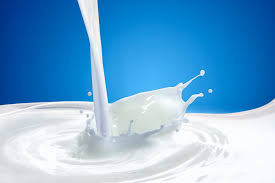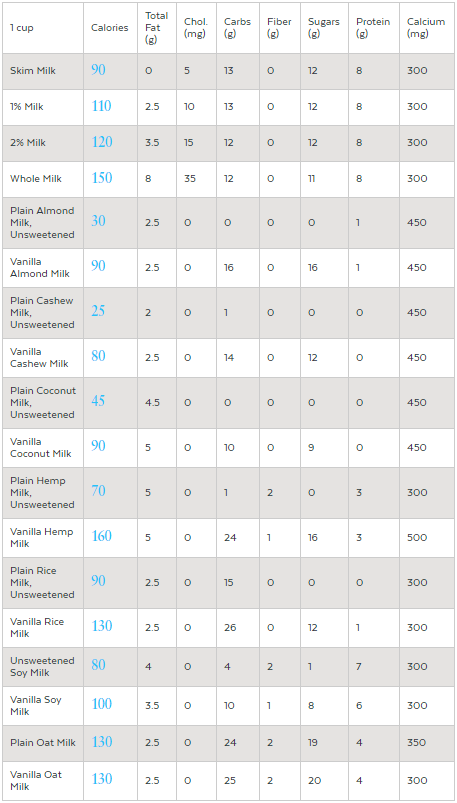Milk is an important part in many people’s diet. It is mostly consumed during breakfast, regardless if you prefer to drink a glass or pour it over your cereals. However, some people do worry if milk makes them fat. After all, a big glass of milk can contain plenty of calories and fat if you choose the whole milk. At the same time, milk is recommended also in several well-known dietary plans. People who follow a 1800-calorie diet are advised to consume three servings of low-fat dairy products every day. Then should you keep drinking milk? What milk products should you choose? Keep reading to find the answers.

Does Milk Make You Fat?
Drinking milk regularly does not cause you to gain weight unless you exceed the necessary calories intake. A glass of whole milk contains approximately 150 calories, while low fat milk (2% fat) contains about 120 calories. 1% milk contains about 110 calories and skim milk contains about 90 calories. So the number of calories will depend on the type of milk you prefer. To keep yourself from gaining weight, you don’t need to avoid certain foods as long as they are within your daily calorie intake boundary. Milk is one of those which should not be avoided. Instead, it should be a part of your diet due to its health benefits.
Actually, the studies show that calcium found in milk and other dairy products can contribute to losing weight by helping the breakdown of body fats. Other milk components like branched chain amino acids, sphingolipids, whey proteins and conjugated linoleic acid are thought to help you lose weight. However, keep in mind to consume milk moderately.
If you are concerned about your weight and the possibility of milk being one of the causing factors, you can choose the suitable milk from the following table which shows the detailed nutritional information of some common milk products.

Other Common Myths of Milk
Besides the question of "does milk make you fat?" there are other myths of milk. Here are some common examples.
1. Drinking Milk Causes Early Puberty
In the last couple of decades, girls tend to enter the puberty earlier than they used to. Many think that milk plays a great role, especially the hormones in milk. However, this seems not to be true as children who consume milk tend to have lower body weight. Today girls also tend to drink less milk than their mothers used to do when they were teenagers. Most bovine growth hormones found in milk can be destroyed with pasteurization. The remaining hormones can be broken down in the body. Keep in mind that milk is a significant source of calcium, especially necessary during the teenage years. Do not eliminate milk from your diet.
2. Drinking Milk Causes Mucus
For many years it was believed that milk plays an important role in the production of mucus. However, until today no significant evidence has been found to link the consumption of milk with an increased production of mucus. It will also not worsen your signs and symptoms of asthma or a common cold. Furthermore, milk can speed up recovery.
3. Drinking Milk Causes Kidney Stones
Apart from "does milk make you fat?" you may also wonder whether milk causes kidney stones. Many people believe that drinking milk will increase the possibility of kidney stones. In fact, studies have shown that milk consumption can even lower the possibility of kidney stones. Although calcium from food does not increase your risk for kidney stones, you should also know that calcium from supplements has been linked to kidney stones.
4. Chocolate Milk Is “Soda in Disguise”
Chocolate milk has all the necessary nutrients just as white milk does. The only difference between these two types of milk is that chocolate milk contains about 60 calories more, as it contains about two teaspoons of added sugar. Chocolate milk contains a little bit more calories than white milk, but there is nothing to worry about. Just pay more attention to the total number of calories you consume during a day.
5. Soy Milk Is Nutritionally Equal to Cow’s Milk
Some people prefer soy milk rather than cow's milk due to different reasons. However, soy milk is low in calcium, containing only about 10 mg per serving. Besides, some necessary nutrients found in cow's milk are not found in soy milk which include potassium, vitamin D, phosphorus, magnesium, etc.
6. People with Lactose Intolerance Need to Avoid All Milk and Dairy Products
People with lactose intolerance usually avoid drinking milk as abdominal cramping, bloating, diarrhea, nausea and flatulence may occur. However, most people with lactose intolerance can consume milk and other dairy products with minimal or no signs and symptoms at all.
7. The Growth Hormones in Milk Are Bad for You
This may be another question you want to know beside "does milk make you fat?" Normally milk contains small amounts of naturally occurring hormones. However, some dairy producers use synthetic bovine hormones to increase the milk production from their cows. Studies have shown that the milk from the cows treated with this kind of hormone is totally the same as the milk produced from untreated cows.
8. Raw Milk Is More Nutritious Than Pasteurized Milk
Many people believe that raw milk is healthier than pasteurized milk. However, this is not true. Raw milk will only increase the risk for various bacterial infections including Salmonella, E.coli, Listeria, etc.
